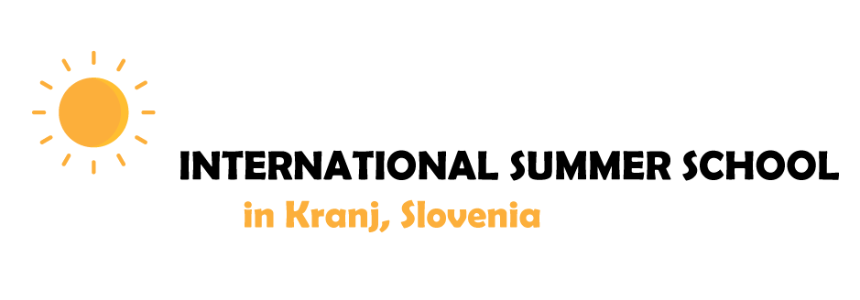SUMMER SCHOOLS
3RD INTERNATIONAL SUMMER SCHOOL “ORGANIZATION, MANAGEMENT & SOCIETY” 2023

The summer school was organised as a Blended Intensive programme (BIP) with a physical and a virtual part.
Virtual part
The virtual meeting was organised as the first, introductory day four days before the physical mobility and as the last activity one week after the on-site summer school. The first virtual meeting served to introduce the faculty and the organisation of the summer school. It consisted of a series of lectures, workshops, the presentation of the company that contributed the case study, workshops and two social events with sightseeing tours to Kranj and Ljubljana. We presented the programme of the summer school, the schedule, the planned working methods and the local and guest professors teaching at the summer school. We welcomed 25 students from 8 European countries. The virtual part of the first day‘ ended with a lecture by Assoc. dr. Gregor Lenart on the subject of Trends in Information Systems. The last day was reserved for the presentation of the student groups’ solutions for the case study competition. The students were divided into six groups. Each group had 15 minutes for the presentation and another 10 minutes to answer the questions of the jury members. After the presentation, the jury discussed the solutions, taking into account the degree of innovation of the proposed solution and its feasibility. At the end, the chairman of the jury justified the order established and the winners of the case study competition were announced. Finally, we dedicated a few words to the participants about their impressions of the summer school and discussed possibilities for improvement. We presented a short student film that had been shot during the summer school.
Physical part
The objectives of the summer school were to provide students from different European countries with a stimulating learning environment and an exceptional educational experience that would enable them to acquire a broader understanding and deeper knowledge in the field of organisation and management in the age of rapidly evolving information systems and AI. Our objectives included: Improve understanding of organisational processes. The aim was to give students an insight into the complexity of organisational processes and how they influence the successful functioning of organisations through the three main pillars of people, processes and information systems. Developing competencies for managing people, which are key to the success of any organisation, where we enabled students to develop communication, leadership and intercultural skills. Understanding the role of information systems, where the aim was to explain how information systems affect the functioning of organisations and how the correct use of information technology can improve efficiency and competitiveness, and the role of creativity in generically generated content. Collaborative learning and creativity, encouraging students to learn together and think outside the box. The development of intercultural competence, where students learned to consider the diversity of approaches to solving challenges and to recognise the impact of culture on ways of working and communicating. Understanding the impact of artificial intelligence on organisations from the perspective of embedded personnel as well as processes and technology requirements. Developing analytical skills, with students learning data visualisation methods for decision making. Combining theory and practise, where the organised case study competition enables students to apply the knowledge they acquired in a real business environment. Fostering teamwork skills, where students learned to work in teams while developing communication and leadership skills. In line with our objectives, we have provided students with a holistic educational experience that will benefit them in their future studies and careers.
KIP methods and results
Methods: A series of expert lectures were organised covering various aspects of organisation and management, including processes, HR, information systems, with a focus on the impact of artificial intelligence on these areas. The lectures were delivered both online and face-to-face.
Workshops: Students were able to gain hands-on experience through workshops such as Lego Bricks, creativity and intercultural communication. The case study competition dealt with a task set by the Aviation Career Centre, Slovenia. This allowed the students to apply their theoretical knowledge to real business scenarios.
Collaborative learning: Students were encouraged to work together and share ideas, both with each other and with professors and company representatives. Group work was essential for solving the case study problem.
The outcomes of the summer school included the knowledge gained, practical skills, improved communication and teamwork skills that will benefit the students in their further education and career path. Networking was also important, as students had the opportunity to exchange ideas with peers from different European countries and make contacts with professors and company representatives.




